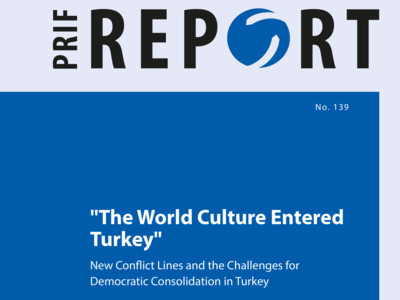Divergences within Turkish society involving different views concerning the best path of development have a tradition that reaches back into Ottoman times. While traditional lines of opposition have divided the Turkish society into “the center” (urban elite) and “the periphery” (rural, conservative and religiously-oriented people), the present polarization (since the AKP first took office in 2002) seems to constitute a fundamental change of political identities due to diverging concepts of democracy.
The AKP rule accounts for certain leaps forward in Turkey’s democratization process. A new civic consciousness has emerged and surfaced in the Gezi Park protest. The government‘s reactions were repressive and uncompromising: growing control of the media and disregard of fundamental rights made it to the international headlines and are cause for concern.
In PRIF-Report No. 139 “"The World Culture Entered Turkey" New Conflict Lines and the Challenges for Democratic Consolidation in Turkey”, Sabine Mannitz and Sezer İdil Göğüş recapitulate the political developments that Turkey has gone through since 2002 and examines the dynamic relationship between democratizing reforms and their pluralizing consequences on the one hand and an evident backsliding of the government into illiberalism on the other. Concluding that Turkey is not necessarily heading towards ever greater authoritarianism as civic consciousness and demands for participation and freedom will influence the country’s struggle for further democratization, the report urges European politics to back up this process through cultural diplomacy and the insistence on the European Acquis when negotiating membership.
The Report is available at PRIF for 10 € and as a free PDF download.
